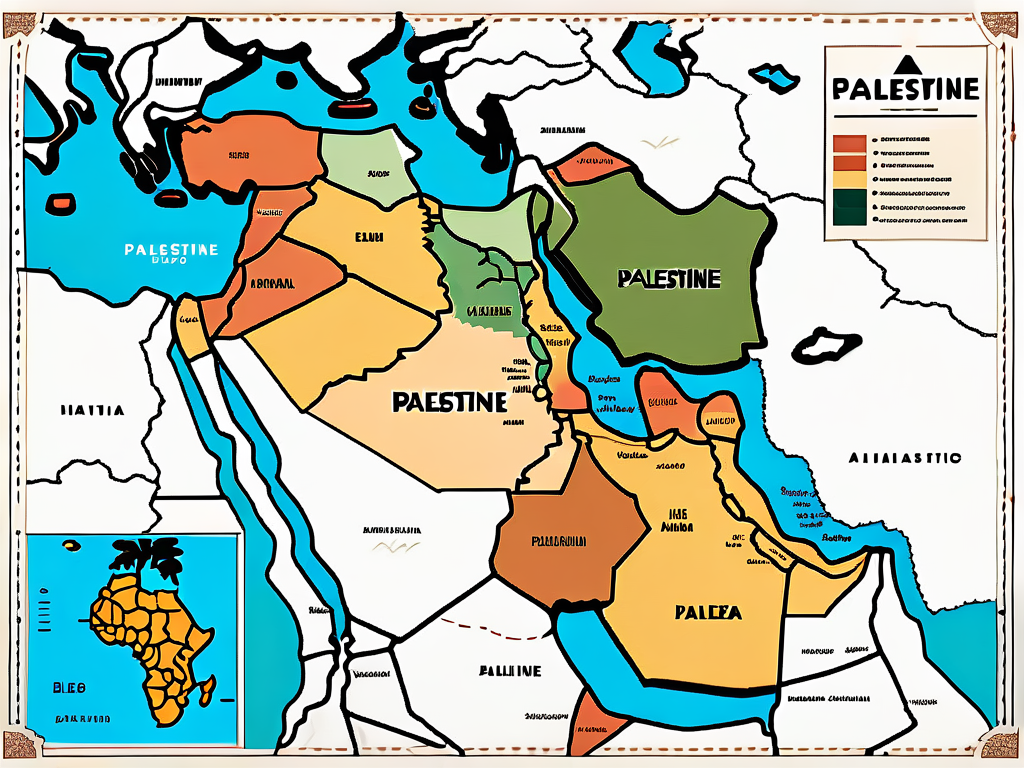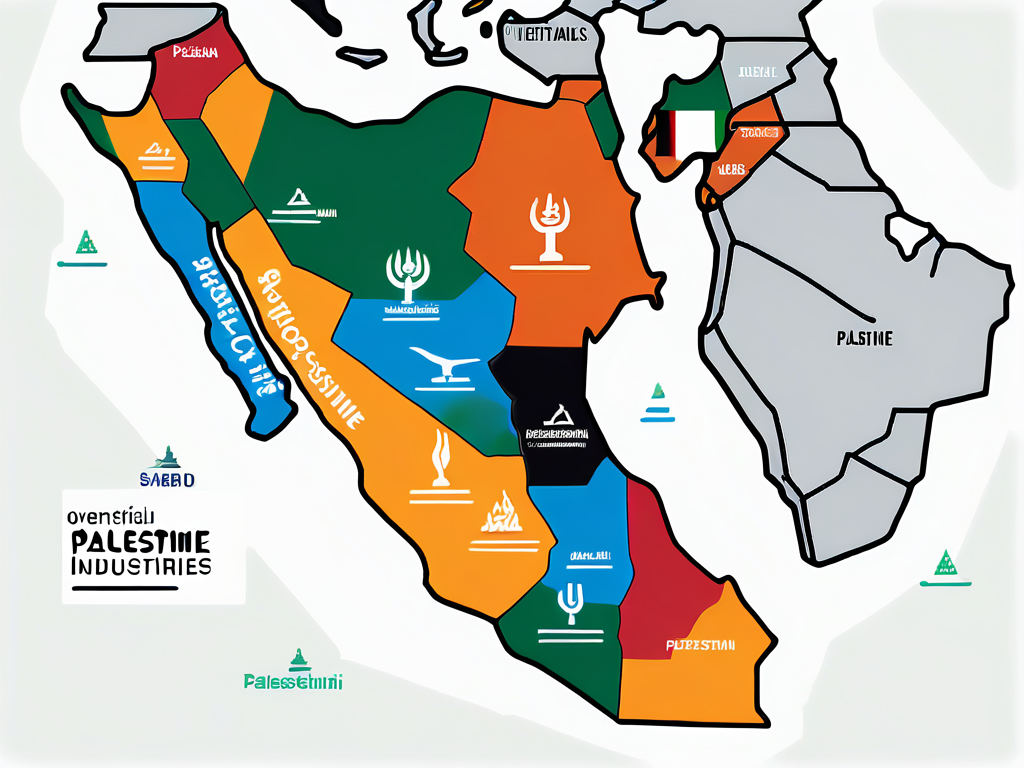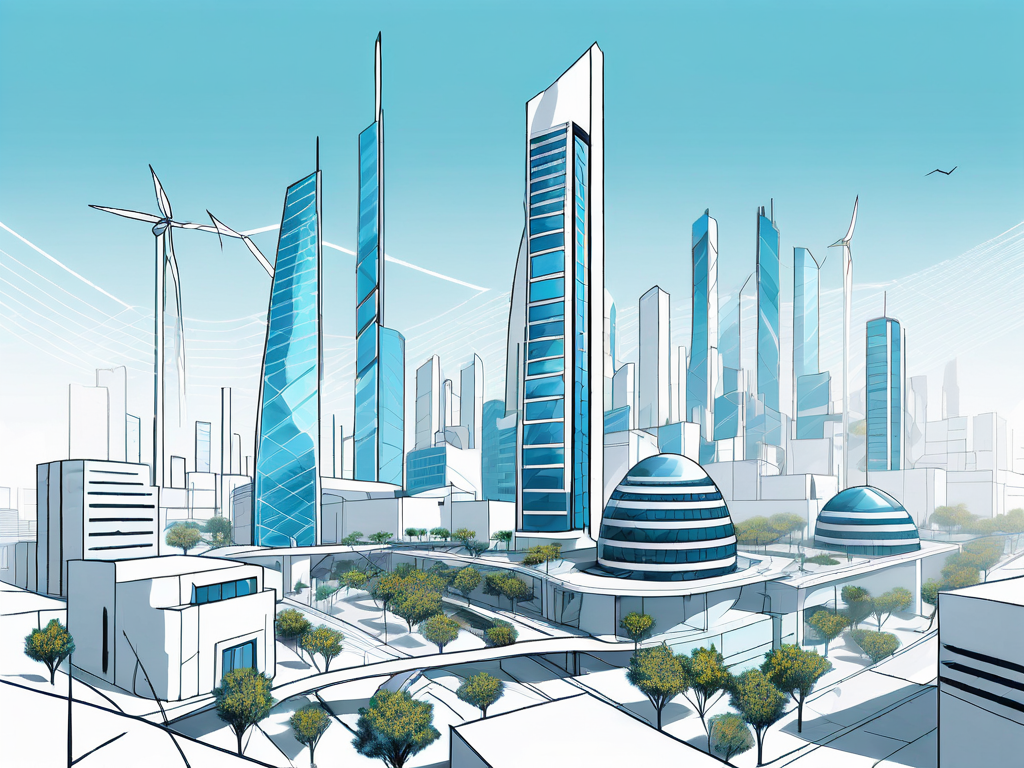If you're looking to gain a deeper understanding of Palestine, you've come to the right place. In this comprehensive guide, we'll explore the historical, geographical, political, socio-economic, and cultural aspects of this fascinating region. By the end of this article, you'll have a solid grasp of Palestine's rich history, diverse landscapes, complex politics, vibrant culture, and future prospects. So, let's dive in and unravel the mysteries of Palestine!
The Historical Context of Palestine
Ancient History and Cultural Significance
Let's start our journey by delving into the ancient history of Palestine, a land steeped in cultural significance. From the biblical accounts of Abraham to the breathtaking ruins of Jericho, ancient Palestine holds a treasure trove of archaeological wonders. Its historical importance has left an indelible mark on the region's identity and influenced countless civilizations throughout the ages.
Ancient Palestine, known in antiquity as Canaan, was a crossroads of civilizations, with influences from ancient Egypt, Mesopotamia, and the Hittite Empire. The region's strategic location made it a coveted prize for empires seeking to expand their territories, leading to a rich tapestry of cultural exchange and conflict.
The Impact of World War I and II
Two world wars shaped the destiny of Palestine. World War I witnessed the fall of the Ottoman Empire and the subsequent British Mandate, which laid the groundwork for future conflicts in the region. World War II further complicated matters with the emergence of Zionist aspirations and the subsequent influx of Jewish immigrants to Palestine.
The aftermath of World War I saw the establishment of the League of Nations and the issuance of the Balfour Declaration, which declared British support for the establishment of a Jewish homeland in Palestine. This declaration set the stage for the Zionist movement to gain momentum and for tensions to escalate between Jewish and Arab communities in the region.
The Israeli-Palestinian Conflict
The Israeli-Palestinian conflict is a complex web of territorial disputes, political tensions, and cultural clashes that continues to dominate the region's landscape. Understanding the roots of this conflict and its impact on the people of Palestine is crucial to grasping the dynamics at play in the region.
The conflict has deep historical roots, with competing narratives of historical land ownership and national identity fueling ongoing disputes over borders, settlements, and the status of Jerusalem. The struggle for self-determination and sovereignty remains a central issue for both Israelis and Palestinians, with peace negotiations and international interventions attempting to find a lasting resolution to this enduring conflict.
The Geographical Landscape of Palestine
Major Cities and Regions
Palestine boasts a diverse range of cities and regions, each with its own unique character and significance. From the bustling streets of Ramallah to the ancient walls of Jericho, these urban centers offer a glimpse into the daily lives and aspirations of the Palestinian people.

Additionally, nestled in the heart of the West Bank is Bethlehem, renowned for its historical and religious significance as the birthplace of Jesus Christ. The city's vibrant markets and cultural heritage draw pilgrims and tourists alike, making it a focal point for visitors seeking to explore the rich tapestry of Palestinian history.
Natural Resources and Climate
Despite its relatively small size, Palestine is blessed with abundant natural resources and diverse landscapes. From fertile agricultural plains to picturesque coastal areas, the region's climate and geography have played a vital role in shaping the lives of its inhabitants.
Moreover, the Jordan Valley, stretching along the eastern border of the West Bank, is a crucial agricultural region known for its fertile soil and temperate climate. This verdant valley not only supports a variety of crops but also serves as a vital lifeline for local communities, highlighting the intricate relationship between the land and its people.
The Significance of the Dead Sea
One of the most iconic landmarks in Palestine is the Dead Sea, a mesmerizing body of water that holds mythical allure and unique therapeutic properties. Known for its high salt content and buoyancy, the Dead Sea attracts visitors from all over the world who seek rejuvenation and a memorable experience.
Furthermore, the Dead Sea's mineral-rich mud and mineral springs have long been revered for their healing properties, drawing visitors seeking relief from various skin conditions and ailments. This natural wonder not only serves as a popular tourist destination but also stands as a testament to the region's geological and historical significance.
The Political Landscape of Palestine
The Role of the Palestinian Authority
The Palestinian Authority plays a crucial role in governing certain parts of Palestine and representing the Palestinian people on the international stage. Established in 1994 as part of the Oslo Accords, the Palestinian Authority was intended to be an interim governing body until a final peace agreement could be reached with Israel. Its structure includes executive, legislative, and judicial branches, with President Mahmoud Abbas serving as the head of state. Despite its authority over civil affairs in some areas, the Palestinian Authority faces challenges in fully exercising its powers due to ongoing Israeli occupation and control over key aspects of Palestinian life.
One of the key functions of the Palestinian Authority is to provide essential services to the Palestinian population, including education, healthcare, and infrastructure development. However, limited financial resources, restrictions on movement imposed by Israeli checkpoints, and internal political divisions have hampered its ability to deliver these services effectively. As a result, many Palestinians rely on international aid and non-governmental organizations to meet their basic needs.
International Relations and Recognition
The question of international recognition and diplomatic relations is an ongoing challenge for Palestine. While over 130 countries have recognized Palestine as a state, major world powers such as the United States and Israel have not, leading to a complex web of diplomatic relationships and alliances. The Palestinian leadership actively seeks recognition from additional countries and strives to gain full membership in international organizations like the United Nations, which would bolster its legitimacy on the global stage.
Furthermore, the issue of Palestinian refugees and their right of return remains a central point of contention in international discussions about the Israeli-Palestinian conflict. The Palestinian Authority advocates for the rights of refugees to return to their ancestral homes, in accordance with United Nations resolutions, while Israel maintains that such a move would threaten the demographic balance of the state. Resolving this issue is crucial for achieving a lasting and just peace in the region.
Current Political Challenges
The political challenges facing Palestine are numerous and complex. Territorial disputes, particularly in the West Bank and East Jerusalem, continue to be a major obstacle to peace negotiations between the Palestinian Authority and Israel. The expansion of Israeli settlements in these areas, deemed illegal under international law, further complicates efforts to establish a viable Palestinian state with contiguous borders.
In addition to territorial issues, Palestinians also face challenges related to access to natural resources, such as water and arable land, which are often controlled or restricted by Israeli authorities. The right to self-determination, a fundamental principle enshrined in international law, remains elusive for many Palestinians living under occupation, leading to ongoing tensions and unrest in the region. Addressing these multifaceted challenges requires a comprehensive approach that takes into account the historical, political, and humanitarian dimensions of the Israeli-Palestinian conflict.
The Socio-Economic Structure of Palestine
Population Demographics
Palestine's population is diverse and encompasses various ethnic, religious, and cultural backgrounds. Understanding the demographics of the region provides valuable insight into the social fabric and dynamics of Palestinian society. The population of Palestine is estimated to be around 5 million, with a majority being of Arab descent. The Palestinian people are known for their rich history and heritage, which is reflected in their traditions, customs, and way of life.

The demographic makeup of Palestine also includes minority groups such as Armenians, Circassians, and Bedouins, each contributing to the cultural tapestry of the region. Religious diversity is another key aspect, with Muslims, Christians, and other faiths coexisting and shaping the social landscape of Palestine.
Economy and Industry
Palestine's economy, though facing numerous challenges, possesses potential for growth and development. From agriculture and tourism to technology and manufacturing, the region's economic landscape offers opportunities for innovation and progress. Agriculture plays a significant role in the Palestinian economy, with olive oil production being a major contributor to the agricultural sector. The tourism industry, particularly in historical sites like Bethlehem and Jericho, also holds promise for economic growth.
In recent years, the technology sector in Palestine has been gaining momentum, with startups and entrepreneurs driving innovation and creating job opportunities. The manufacturing industry, although facing obstacles such as limited access to resources and markets, shows resilience and potential for expansion.
Education and Healthcare System
Access to quality education and healthcare is essential for the well-being and development of any society. Exploring Palestine's education and healthcare system sheds light on the challenges faced by its people and the efforts being made to overcome them. The education system in Palestine faces challenges such as overcrowded classrooms, limited resources, and restrictions on movement that affect access to schools and universities.
Similarly, the healthcare system in Palestine grapples with issues of access to medical facilities, equipment, and specialized care. Efforts are being made by local and international organizations to improve healthcare infrastructure and services, ensuring that Palestinian communities receive the medical attention they need. Despite these challenges, Palestinian educators and healthcare professionals continue to work tirelessly to provide quality services and opportunities for the people of Palestine.
The Cultural Aspects of Palestine
Religion and Its Influence
Religion plays a central role in the lives of many Palestinians. Whether it's the deep spiritual connection to Jerusalem for Muslims, Christians, and Jews, or the vibrant expressions of faith through traditions and rituals, religion permeates Palestinian culture in profound ways.
The religious diversity in Palestine is a testament to its rich history and cultural tapestry. The Old City of Jerusalem, with its iconic sites such as the Western Wall, the Church of the Holy Sepulchre, and the Dome of the Rock, serves as a focal point for pilgrims and visitors from around the world. The call to prayer echoing through the narrow streets, the scent of incense wafting from churches, and the bustling markets selling religious artifacts all contribute to the unique religious atmosphere of the region.
Palestinian Cuisine
Exploring the tantalizing world of Palestinian cuisine is a delightful journey for both the taste buds and the soul. From the aromatic flavors of falafel and hummus to the comforting warmth of maqluba, Palestinian cuisine embodies the region's rich culinary heritage and cultural diversity.
The culinary traditions of Palestine are a reflection of its geography and history, with influences from Mediterranean, Middle Eastern, and North African cuisines. Olive oil, a staple in Palestinian cooking, symbolizes peace and abundance. The use of fresh herbs, spices, and seasonal produce not only enhances the flavors of the dishes but also highlights the importance of sustainability and connection to the land.
Art, Literature, and Music
The artistic expressions of Palestinians are as diverse as the people themselves. From poignant literature that captures the nuances of the Palestinian experience to captivating music and vibrant visual arts, Palestinian creativity knows no bounds.
Palestinian art and literature have long been used as forms of resistance and resilience in the face of adversity. Poets like Mahmoud Darwish and artists like Sliman Mansour have become iconic figures in the Palestinian cultural landscape, using their work to convey the struggles and aspirations of their people. Traditional music such as dabke, a lively dance accompanied by rhythmic drumming, serves as a celebration of community and heritage, bringing people together in joyous harmony.
Future Prospects for Palestine
Peace Process and Negotiations
The quest for lasting peace in the region has been a long and arduous road. Exploring the intricacies of the peace process and ongoing negotiations offers hope for a better future and a deeper understanding of the challenges that lie ahead. Delving into the historical context of past peace agreements and analyzing the current geopolitical landscape can provide valuable insights into the complexities of achieving sustainable peace in Palestine.

Furthermore, engaging with key stakeholders and understanding their perspectives is crucial for fostering meaningful dialogue and building trust among all parties involved. By promoting inclusivity and mutual respect, the peace process can move towards a more collaborative and constructive direction, paving the way for a peaceful coexistence in the region.
Economic Development and Challenges
Unlocking Palestine's economic potential is crucial for its sustainable development and the well-being of its people. By addressing the economic challenges and harnessing opportunities for growth, Palestine can pave the way for a brighter future. Exploring innovative strategies for economic diversification, promoting entrepreneurship, and investing in key sectors such as technology and renewable energy can drive sustainable economic growth and create new opportunities for Palestinian communities.
Moreover, addressing socio-economic disparities and enhancing access to quality education and healthcare are essential components of fostering a thriving economy and improving the overall well-being of the Palestinian population. By prioritizing inclusive and sustainable development initiatives, Palestine can overcome economic challenges and build a more prosperous future for generations to come.
The Role of the International Community
The international community has a significant role to play in shaping the future of Palestine. From diplomatic efforts to humanitarian aid, understanding the impact and involvement of the international community is essential for comprehending the possibilities and limitations for Palestine's path forward. Collaborating with international organizations, fostering partnerships with donor countries, and advocating for human rights and social justice on a global scale can amplify the voices of Palestinians and support their aspirations for a peaceful and prosperous future.
By engaging in constructive dialogue and promoting multilateral cooperation, the international community can contribute to building a more stable and inclusive environment in Palestine. Empowering local communities, supporting grassroots initiatives, and advocating for a just and lasting resolution to the Israeli-Palestinian conflict are critical steps towards realizing a future of peace and prosperity for all inhabitants of the region.
Support Peace Through Creativity with BakeMeMate
As we reflect on the future prospects for Palestine and the role of the international community, consider expressing your support for peace and cultural understanding in a creative and delicious way. BakeMeMate invites you to explore our unique collection of Palestine Cookie Cutters, perfect for all occasions. Whether you're interested in custom designs or want to celebrate the rich tapestry of cultures around the world, our high-quality cookie cutters are just a click away. Check out our Palestine Cookie Cutters and join us in crafting treats that bring joy and foster unity.

